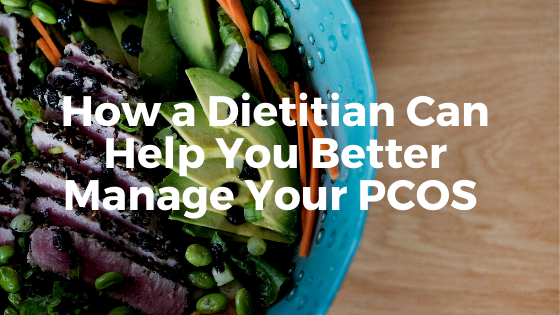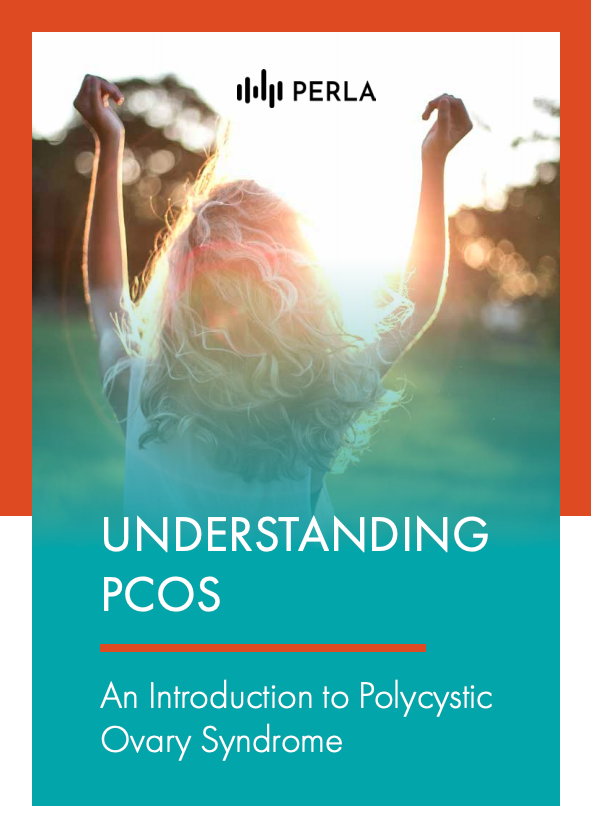As you may have heard, diet can have a big impact on PCOS: Weight loss is often mentioned as one of the first actions to take for women with PCOS (Polycystic Ovary Syndrome) who are overweight. Healthy eating and more physical activity can help with weight loss, and eventually even improve the symptoms of PCOS.
Let’s explore how diet impacts PCOS, and how a dietitian can help you manage your symptoms:
Diet and PCOS – Which Diet Works Best For PCOS?
There’s no denying that what you eat plays a significant role in the management of PCOS and many other metabolic diseases, and even a weight loss of 5% can improve symptoms of PCOS such as insulin resistance, hyperandrogenism, menstrual function and fertility.1
According to the Academy of Nutrition and Dietetics, a healthy eating plan for women with PCOS should include:2
- Four to five meals each day (including breakfast and snacks).
- A variety of food from all food groups: grains, fruits and vegetables, lean protein, and low-fat dairy.
- Healthy fats found in olive oil, nuts, and avocados.
- Protein in all meals and snacks.
- Healthy drinks such as water, soy-based drinks, low-fat milk, and natural fruit juices without added sugar.
It is a myth that there’s a one specific diet that works for everybody with PCOS. To find out what works best for your body, your needs and lifestyle, we recommend working with a dietitian, especially one that understands your specific needs with PCOS.
Working With Registered Dietitians When You Have PCOS
Let’s define some terms first that you may have come across when reading about diets: What is the difference between a dietitian and a nutritionist?
A registered dietitian (RD) or registered dietitian nutritionist (RDN) requires years of education and training and must pass a rigorous registration exam to become qualified experts in the field.3
Both nutritionists and dietitians are healthcare professionals that specialize in the use of food to promote good health. But, only dietitians are involved in the diagnosis and management of diseases such as eating disorders, diabetes, and other medical conditions. A dietitian’s role is more regulated than that of a nutritionist. Technically, “all registered dietitians are nutritionists but not all nutritionists are registered dietitians.”3
A nutritionist is not a generally protected title and some people call themselves as such even without professional training. Nutritionists with advanced degrees refer to themselves as C.N.S or certified nutrition specialists.
Benefits Of Consulting A Dietitian
While many people choose foods for their nutritional value, other factors also influence food choices: Our habits, emotions, preferences, convenience, and religion affect why we choose some foods over others.4
Because of these factors, many find it difficult to make changes to their diet. Especially if you cannot find some food items in your local market, if you don’t have time to prepare them, if they don’t fit into your budget, or if you have other restrictions. This is why it’s great to work with a dietitian that can customize your diet to your needs and lifestyle.
Your diet should also be optimized to prevent common health problems associated with PCOS, such as obesity, heart disease, insulin resistance, and diabetes. A dietitian will recommend problem-solving strategies to encourage forming healthy eating habits that you can follow for a long time.
This could include assisting you in choosing alternative foods to reduce your overall sugar and unhealthy fat intake. You don’t need to calculate your macronutrient needs (carbohydrate, protein, and fat), your dietitian will do it for you.
Your dietitian will also take on the following important roles:
- Plan and prescribe a diet based on your medical condition and individual needs
- Prepare you mentally to accept the modified diet
- Make the diet more appetizing and appealing
- Motivate you to be more empowered in making positive dietary changes
- Help you explore your feelings about changing your eating behavior
- Establish a supportive relationship to improve adherence
If you want to change your diet to improve your PCOS symptoms it’s a great idea to work with a dietitian who can work with you to create a customized diet plan, based on your needs and requirements. Just make sure you are working with a dietitian registered with a professional association such as the Commission on Dietetic Registration (CDR).
Dietitians organize food and nutrition care plans to improve your eating habits or achieve health-related goals such as losing weight or regulating blood sugar levels. They are a great partner to have by your side when looking at how to best manage your PCOS symptoms. Ask your doctor or care team to recommend a qualified dietitian that has experience in working with women with PCOS.
Sources:
- Rondanelli M, Perna S, Faliva M, Monteferrario F, Repaci E, Allieri F. Focus on metabolic and nutritional correlates of polycystic ovary syndrome and update on nutritional management of these critical phenomena. Archives of gynecology and obstetrics. 2014 Dec 1;290(6):1079-92.
- Polycystic ovarian syndrome. Accessed June 15, 2020. https://www.eatright.org/health/pregnancy/fertility-and-reproduction/polycystic-ovarian-syndrome
- Commission of Dietetic Registration (CDR). RDN Credential—Frequently Asked Questions. http://www.cdrnet.org/news/rdncredentialfaq. Accessed June 12, 2020.
- DeBruyne LK, Pinna K, Whitney E. Nutrition and Diet Therapy : Principles and Practice. 9th ed. Belmont, CA : Wadsworth/Thomson Learning; 2015. Accessed June 15, 2020. https://trove.nla.gov.au/version/239823379


